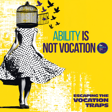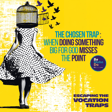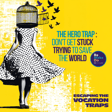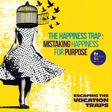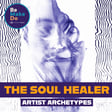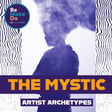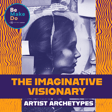Become a Creator today!Start creating today - Share your story with the world!
Start for free
00:00:00
00:00:01

Artist Archetypes: The Prophetic Critic
Having a clear understanding of your motivations for creating allows you to stay focused and not get sidetracked by chasing success or fame.
In this episode of the Be. Make. Do. podcast, Lisa and Dan discuss The Prophetic Critic Archetype focusing on why artists create and how understanding motivations can lead to fulfilling careers and a strong sense of identity and purpose.
The Maker, The Mystic, The Soul Healer, The Imaginative Visionary, The Prophetic Critic or the Storyteller? What's your archetype? Take the quiz here!
Stay in touch and share your thoughts:
TikTok: @bemakedopodcast
Instagram: @bemakedopodcast
Facebook: @bemakedopodcast
YouTube: @BeMakeDoPodcast
Subscribe and Follow wherever you get your podcasts.
Transcript
Introduction to Soulmakers Podcast
00:00:12
Speaker
Hello, welcome to Be Make Do, a Soulmakers podcast where we talk about what it takes to pursue your calling as an artist with spiritual wholeness and creative freedom. I'm your host, Lisa Smith, here with my producer, and I almost said co-host because that's really what what it is for these conversations. I'm here with Dan. Hello, everyone.
00:00:30
Speaker
Yay!
Exploration of Prophetic Critic Archetype
00:00:31
Speaker
And today we are talking about the prophetic critic. We are at the end of the list of our artist's spiritual archetypes. Saving, i don't know if it's the best for last, um but ah another wonderful one for last.
00:00:45
Speaker
Yeah. And I'm excited to talk about this one because it's actually one of the rarest types, like by far the rarest type. Certainly that kind of bore out in our quiz.
00:00:58
Speaker
We had the fewest people signed up or fewest people who ended up testing as the prophetic. Right, right. I noticed that because we've had like several hundred people over the past few weeks take this quiz and it's still, there there are, they're out there, but it is the lowest number. Yeah, yeah. so few and Another interesting tidbit is they would win the award for most likely to abandon the quiz.
00:01:23
Speaker
when When asked to give your email address ah to get the results, they're like, no, I'm out of here. And totally when I saw that, I thought that was hilarious because it it really perfectly fits with the the prophetic critic kind of sensibility of like,
00:01:40
Speaker
Don't put me in a box. Don't make me do something. What are you going to do with that information? So it's just really hilarious that like even in taking the quiz, they're showing um who they are.
00:01:52
Speaker
so it's really really kind of cute, actually.
Nurturing Prophetic Critics from a Christian Perspective
00:01:55
Speaker
But I'll say that you know the prophetic critic is a big part of where soulmakers came from was the desire to... um reach out to find, equip, nurture, and raise up more prophetic critics um who specifically are coming from a Christian perspective and are really, really good as artists and believing that they are important to our world, especially right now.
00:02:19
Speaker
So looking forward to talking about them. Yeah. And if you haven't taken the quiz yet, be sure to do that at soulmakers.org backslash quiz, or just click on that link in our show notes.
00:02:31
Speaker
right, well, with that, let's get started. Let's get started.
00:02:44
Speaker
Before we kind of dig into who the the or the motivations of the the prophetic critic, I want to clarify what I mean by the word prophet or prophetic, because that can get a little um confusing. So a lot of times when you say the word prophet or prophetic, people think about somebody who like dreams, dreams, or can predict the future or can speak into somebody's life in a supernatural way.
Art's Transformative Power and Societal Impact
00:03:11
Speaker
And while that is certainly ah part of some of what it means to be a prophet in the Bible, what's overarching about prophets in the Bible, about the prophetic sensibility, is somebody who has a really strong sense of the heart of God and what matters to God, what breaks God's heart,
00:03:32
Speaker
what God really desires and wills and wants for the world and for a people is also on my heart. Like I can feel it as a prophetic critic. I feel it.
00:03:43
Speaker
It pains me. i want what God wants in the world. At the same time, I also feel for my fellow man, and I see the heartbreak and the hardships, and I see where people are are not doing the things that God has laid out that are going to make us happy and fulfilled and have a good life and a connection with God.
00:04:04
Speaker
So to describe the prophetic critic, because it is kind of a complex archetype, I'm just going to read exactly what's on the website because it's it's well put. It says,
00:04:20
Speaker
and prompt people to action the artist as prophetic critic attends to what's wrong in the present situation relating the present to the past and the future They're motivated by a belief in the power of art to transform lives and cultures and the possibility of creating something of enduring value.
00:04:39
Speaker
So the prophetic critic works hard to benefit a cause that they believe in. When they believe in something, they will do whatever it takes to try to push that forward. They have ah maybe a heightened sensitivity to the the needs and the underlying currents of kind of what's going on in the world, and usually before other people are even aware that it's happening. They're the first to see what's wrong and start to think of solutions to remedy it. And they're just compelled
00:05:10
Speaker
to make an impact, to make a positive impact on others through their artwork. That's the motivation, right? they It's almost like you you can't help it. They have this sense of urgency to speak and to act.
00:05:22
Speaker
And they do, i mean, they're incredible. They tend to be very self-disciplined and focused, right? And able to
Historical Influence of Prophetic Critics
00:05:29
Speaker
devise unique solutions to complex problems and be extremely creative in the way that they engage people towards change.
00:05:39
Speaker
And artists who have worked in this way, who have that sensibility um and who do it well... can make incredible impact on not just individual lives, but on cultures in general, um even creating movements.
00:05:57
Speaker
And I think about um like the artists of the Harlem Renaissance. They were you know musicians and visual artists and writers who were trying to present African-American culture in a modern sensibility, an urban sensibility of cosmopolitan, a new way of like, this is who we define ourselves as.
00:06:25
Speaker
This is how we want to present ourselves and to explode creativity and a totally new way, which had impact in the I guess it was the 1920s in that that time, not only on um particular cities in the U.S., not just American life, but European life. I mean, jazz traveled all over the world and had such an incredible um impact it.
00:06:53
Speaker
on Europe and bringing kind of the world into the 20th century and in this way. so it's i mean That's just one example of how people who who want to accomplish something specific um in the world or in people's lives through their art, how how significant that can really be.
00:07:15
Speaker
and These people, and these prophetic critics are so valuable for a culture. And I do believe that they are valuable for the church as well. And this is why it's so important that we can nurture and develop mature prophetic critics who are capable of doing things in ways that have meaningful impact.
00:07:38
Speaker
um And not to to um just turn turn people away who are saying things that we don't want to hear or we're not ready to hear or we don't know what to do with. um Because very often these can be a type of or a sensibility that's difficult within an institutional space because it rocks the status quo and it requires change.
00:08:00
Speaker
And so that's difficult, I think, within the ah maybe all the archetypes. This might be one of the most difficult for churches to understand how to ah support and encourage and disciple.
00:08:13
Speaker
um But understanding um where why they're motivated to say these things can help us to figure out how to be able to encourage and support them because they are necessary and they are important um for our spiritual health as well.
00:08:31
Speaker
Right. For me, i don't know too many of these currently in my life. I started to think about that looking at the ah the quiz results of like, where are
Challenges Faced by Prophetic Critics Today
00:08:42
Speaker
they all at? And I love what you said about, you know, it seems like they're out there.
00:08:47
Speaker
They're like hidden in plain sight almost. But also like, I wonder if there's sometimes it feels like there could be working from that place. That motivation is a little harder due to how our culture is right now.
00:09:00
Speaker
I wonder, this is just me thinking about it, but I'm wondering, where they all at? Is it because of where our culture's at right now? Or are they all there and they're about to rise up and we're about to see ton of them? You know what I mean? Yeah. I mean, I actually think there's...
00:09:17
Speaker
been a rise in the ah popularity of the activist mentality certainly in the last five years or so. And i I think that that's true within the world of the church as well. But i think I think there are a lot of challenges for somebody who stands in this prophetic place within institutions.
00:09:43
Speaker
and So they tend to get in trouble with institutions. Like churches? Like churches, right? Because an institution, and part of their job is to maintain the status quo, to keep things going, to keep the lights on. you know And there's a lot of concerns within you know ah things that have to be done to make that happen, which is important because But then it is also important to have the prophetic voice to say, okay, you say this thing, but are you living up to that thing? um and And I think that's a lot of what the the prophetic voice does is say, you know here here's so what we proclaim to believe and to want to be in the world.
00:10:26
Speaker
And here's the result or here's the reality of how that's playing out. um And that's not a message that anybody wants to hear. i would not be all that crazy about you coming to me saying, you know, Lisa, you say you're all about this thing.
00:10:40
Speaker
And yet I don't see that in your life at all. And I would say, well, I don't want to talk to you anymore right now, Yeah. Go away. yeah that's That's human, right? So it's it's a really necessary role, but it's also and uncomfortable one.
00:10:55
Speaker
um And I think that there are oftentimes, I think artists who are prophetic critics Usually are, again, if you're in a place where you're doing it well, you're really good at what you do, really good at artistry, spending a lot of time in prayer and discernment, and then really paying attention to how other people think, understanding your audience really, really well so that you know how to talk to them.
00:11:24
Speaker
in a way that gets their attention, in a way that captures their heart, in a way that promotes action without alienating them and turning them off.
Artists as Social Critics: Examples and Strategies
00:11:34
Speaker
And I would say in our culture right now, we have a plethora of people who don't care about the first part of that.
00:11:40
Speaker
You know, who have something to say, who see what see what's wrong, but are maybe not as willing to take the time to really do the self-reflective work, the self-discipline work, the self-examination for self-hypocrisy, and really caring and being concerned about um who you're trying to talk to so you can talk to them in a way that...
00:12:01
Speaker
Yeah, you can still get people's attention and even shock and even offend, but in a way that's going to lead to um a a constructive process of self-reflection or conversation and dialogue.
00:12:17
Speaker
Yeah, there are a lot. I think there are. A lot of artists who are, you know you might know that you might think of them as activists might be a way to another way to um think about them. People like Banksy or Ai Weiwei, Diego Rivera, a lot of visual artists, a lot of writers. You can think of even like Charles Dickens or Victor Hugo, people who were writing about the times that they lived in.
00:12:42
Speaker
trying to help people to see um the injustices that were there and through their writing, help people to have sympathy with different perspectives and make changes in the way that that things were.
00:12:55
Speaker
People like Toni Morrison, Bono. I mean, Bono is a great example of ah of a a Christian artist who is I would definitely say falls within that prophetic critic. And again, we are talking about artists specifically. We're also getting into that earlier, like identifying actors and filmmakers and different people who are activists, and then they do art.
00:13:16
Speaker
But they're not they're not focused on the message through their art. And that's with prophetic critics, we're talking about people who are using properly. because they believe so deeply and so powerfully in the power of art and what art can do, they're harnessing it um to help people see things in a different way, to hold a mirror up to themselves, to um kind of light a fire and motivate towards something good.
00:13:49
Speaker
Mm-hmm. toward a different ah different way of being so usually they are very um self- motivattivated they are able to act they don't usually have a sense of like oh gosh should i shouldn't i you know there it's more on the other and is where the challenges come is working with other people sometimes because they take what they're doing so seriously. right um And it's so important that they can become frustrated with people who don't see the importance the way that they do or um their their language can is just very clear and direct.
00:14:32
Speaker
I think with all of the archetypes, it's the same thing, that that these are ways of approaching the world that God has gifted each of us with.
00:14:43
Speaker
you know Kind of like with the soul healer, a challenge is to remember that you are not responsible for the outcome. that God has not tasked you with the outcome and the results of the work, um but your your job is to be faithful with that.
00:14:59
Speaker
And I think if if you're able to ground yourself in your identity again in Christ as opposed to the results that you're getting or why aren't they making the change, then you can hold it a little bit more loosely and hold hold hold it lightly and maybe even with a sense of humor um and playfulness, which is funny because like – Court jesters, in a way, were like the prophetic critics of their time.
00:15:25
Speaker
um They earned the right to say ah things that other people couldn't say, critiques and criticisms and things that might even get other people killed in the court because they said it through humor and through jest and you know poking fun and in ways that's like, oh, yeah, you got me.
00:15:44
Speaker
you know And not that I'm not saying that prophetic critic artists are jesters, but I do think that that that is a little bit of it, of like holding it with lightness and humor to recognize ah not just what's wrong out there, but to have the humility to be self-reflective and spend a lot of time looking at where am I where am i being hypocritical. Yeah.
00:16:10
Speaker
you know how How do I myself fall into these traps? like Identifying and being comfortable with the our humanness also allows us to be able to speak to other people about their humanness in a way that's that's inviting. It's that invitational conversation that we were kind of saying earlier.
00:16:28
Speaker
um So that we're we're doing something in a way that invites connection, invites action instead of causing damage. Right. Right. I think artists who are prophetic critics usually are, again, if if you're in a place where you're doing it well, you're really good at what you do, really good at artistry, spending a lot of time in prayer and discernment. Yeah.
00:16:53
Speaker
And then really paying attention to how other people think, understanding your audience really, really well so that you know how to talk to them in a way that gets their attention, in a way that captures their heart, in a way that promotes action without alienating them and turning them off.
00:17:12
Speaker
And I would say in our culture right now, we have a plethora of people who don't care about the first part of that. you know, who have something to say, who see what see what's wrong, um but are maybe not as willing to take the time to really do the self-reflective work, the self-discipline work, the self-examination for self-hypocrisy, and really caring and being concerned about um who you're trying to talk to so you can talk to them in a way that, yeah, you can still get people's attention and even shock and even offend, but in a way that's going to lead to ah constructive process of self-reflection or conversation and dialogue.
00:17:54
Speaker
Yeah, I can really see like crossover with
Collaboration Between Archetypes
00:17:58
Speaker
this one. And I don't just mean, i don't, I'm actually not even talking about crossover with the motivations. I mean, crossover of that individual and another crossover ah of ah another archetype. So for example, I can give a good one.
00:18:11
Speaker
Can I give you a good one? Yeah. maybe 10 years ago um working with your husband jay and i thought because i was coming from that soul healer place and through and through at that point i felt like when i look at this that's how i view jay your husband as a prophetic critic and so when we were working on um a project together um for an outreach program which was called the lab all ages The name is important.
00:18:38
Speaker
the The thing is that how we were building that, we were both sort of in leadership roles, but he was coming from a very different place than I was because as a soul healer, as our our previous Archetype episode, um which I fall under, working with Jay to make this thing, this kind of big community thing happen would not be possible without me and without him because he was definitely coming from from that place right and looking at things that I was not looking at.
00:19:08
Speaker
But there were things that I was doing that probably at that time he was not willing to do and didn't need to do. But I was very good at that and he was very good at this. so Right, yeah, you both have different... yeah Motivations, which then made something really successful because you are looking at building this community for the sake of the people involved in the community.
00:19:29
Speaker
And Jay's looking at building the sake of this community for the sake of starting a movement of a different way of doing music and fostering um creativity and yeah that kind of stuff in the DC music scene. And then putting that together you're able to like put all those pieces together because you didn't both have to have the same gifts and motivations. Yeah.
00:19:54
Speaker
Yeah. For sure. Yeah. That's a great example. Well, I think a couple of things that just ah going over some of these, you know, results on the quiz too, or eyeopening for me where I saw some crossover ah with the soul healer, but also like, I think not having um spiritual disciplines,
00:20:13
Speaker
will cause this archetype to have the same thing that the soul healer has, the burnout and the depression and feeling like everything's a failure, you know, because it maybe didn't go according to plan.
00:20:28
Speaker
And also you're working with people too, know what I mean? And so same thing, or working through people, so same sort of thing as some of the other archetypes, but more so with the soul healer is avoiding that burnout.
00:20:42
Speaker
Right, right. You know, and when is enough? And again, I i take this archetype, this motivational archetype of how this person works is that they take things very seriously. Yeah.
00:20:59
Speaker
yeah But how serious? Yeah, I think they're really good at seeing the problems. They're really good at um understanding the weight of it. They can be really good at motivating and mobilizing other people um in service of their cause.
00:21:17
Speaker
um But then, yeah, it's easy to miss your own blind spots. And that's that's kind of the the the main challenge there is like developing that humility and healing from past wounds and really going deep with self-knowledge so that you can avoid that burnout and depression, that you're very clear that you're not you're not God, obviously, and you're not responsible for making all the changes. And I think that these are really, really important things.
00:21:47
Speaker
um people in kind of the archetype toolkit um for our world. And I think as as church leaders, spending the time to really disciple and um encourage and help these prophetic critics to develop a kind of a mature sensibility so that they can um be a voice in the world is really, really important.
00:22:13
Speaker
Yeah. And to have that impact. Yeah, absolutely.
Artist Archetype Quiz and Personal Growth
00:22:16
Speaker
They definitely have a special place in my heart for sure.
00:22:20
Speaker
Well, that is our last archetype. That was a quick one, but it's been ah incredible conversation, um this look through all of these different motivations and the ways that reasons why artists create.
00:22:35
Speaker
um And if you haven't taken the quiz yet, I definitely invite you to do that. um You can ah go back and take the quiz. You can go back and listen to these podcasts so that you can hear all the different archetypes and find out more on our website.
00:22:49
Speaker
I hope that you really take some time to think about how God wired you. And just embrace that as a good thing. and And hopefully in understanding these innate desires and needs that you're just then able to go out and take the next steps to figure out how do I nurture and mature and support that?
00:23:11
Speaker
So how do I grow into a spiritually mature and effective prophetic critic or soul healer or mystic or maker or imaginative visionary or storyteller? Whatever you are, um that's the task.
Next Episode Preview
00:23:26
Speaker
And be sure to check out our website at soulmakers.org for resources, sign up for our email list, and get more information on other tools, upcoming resources, and regular updates from us.
00:23:38
Speaker
Be sure to join us for our next conversation with Corey Frey, musician, curator, community builder, about what motivates him to create art and create community.
00:23:49
Speaker
See you next time.
00:23:52
Speaker
Thanks for listening to Be Make a Soulmakers podcast. All links and resources are located in our show notes. Want to know your artist archetype? Take the quiz at soulmakers.org backslash quiz.
